Making Of: The Empire of Brazil
- Thread starter Planck
- Start date
-
We have updated our Community Code of Conduct. Please read through the new rules for the forum that are an integral part of Paradox Interactive’s User Agreement.
You are using an out of date browser. It may not display this or other websites correctly.
You should upgrade or use an alternative browser.
You should upgrade or use an alternative browser.
It wouldn't be easy to take Portugal in a single war - nay, it would be impossible. But perhaps humiliating them, finding a way to make them acknowledge Brazillian Suzerainity... That could be done. And so shall it be! Dom Pedro II must be Emperor!
Focusing on industry is hard, and it takes a good deal of incentive to get any sort of urbanization until late in the game from my experience. Which is sensical, but a little melancholy as well. You seem to have a good base brewing though, and I'm sure increases in literacy (or fresh Portuguese terrain!) could prove helpful...
Focusing on industry is hard, and it takes a good deal of incentive to get any sort of urbanization until late in the game from my experience. Which is sensical, but a little melancholy as well. You seem to have a good base brewing though, and I'm sure increases in literacy (or fresh Portuguese terrain!) could prove helpful...
It's more a matter of honor! I'd really appreciate if there was a kind of "Restore Union" wargoal. I could try to mod it in myself just for this historical case, but I think that would look a bit gamey...
Don't listen to him! As a brazilian fan of your AAR ! I demand your remove that traitor of an uncle from the throne of Portugal! Dom Pedro II must have his rightful throne!
that's right
Of course Brazil should undertake a military expedition to Portugal... for old times sake. It could even win you some colonies! 
You still need 2 more chapters for the contest till the 15th November, so i hope you will be able to update soon 
Also a Brazil with colonies in Europe would be awesome - Reverse colonialism so to say
Also a Brazil with colonies in Europe would be awesome - Reverse colonialism so to say
Sure thing  I expect to have a very interesting update finished on Wednesday. It'll be worth it. And more after that one.
I expect to have a very interesting update finished on Wednesday. It'll be worth it. And more after that one. 
Chapter IV
The Brazilian supreme monarch Pedro II, to the people a sign of strength and hope for the future of Brazil, but at the same time a person with feelings and family like any other, read the letter from his sister Maria of Portugal again. The one letter which was stored in the drawers of his room for many months already and there he was too, alone. After finishing it he closed his eyes and sighed.
And so it was clear. The wretched scourge of the Brazilian people, the demagogue Teófilo dos Reis, the “hero of the Cisplatinean War”… he was involved, directly, in the death of Pedro’s sister – he and all the money he shameless stole from the land AND from the Emperor he was supposed to honour. And worst of all: he was at the service of Miguel, the usurper.
The Great European War of 1844
The war raged on Europe. For almost one whole year, it seemed the conflict would not end. On the heights of the Pyrenees many soldiers – Spanish, Portuguese and French - found their ultimate resting place. Endless battles were fought there. At the same time, Prussians and Austrians fought on Bohemia. And daily skirmishes, albeit less intense than the other battles elsewhere, happened in Alsace-Lorraine between Prussians and French. It was truly a Great War.
It was a long established policy of the Americans, especially South Americans, to leave the problems of Europe to the Europeans. There was nothing to gain by meddling. But this time, it was different. Brazil watched from afar, with the view set on one place in Europe, and one place only: Portugal.
Delayed reports of battles, which had to be transported by ship across the Ocean to reach Brazilian shores, were to be relayed almost immediately to the Emperor. He wanted to be up-to-date, and so it continued for almost a year. The Brazilian population would never expect that the Military would take any part on this war. The Brazilian industry continued to expand with regular investments by capitalists all over the country, everything seemed peaceful and normal.
The only thing that might have raised suspicion was the recall of troops from other regions of Brazil to the main port of Rio de Janeiro in the Southeast, where also 2 of the 3 Brazilian fleets were located.
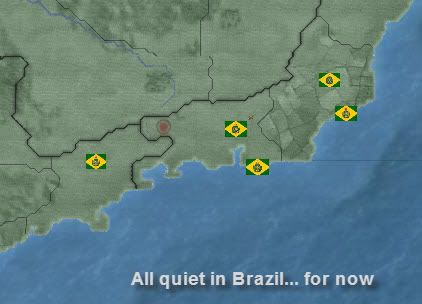
But just like Dom Pedro II waited for years until it was the right moment for him to be crowned Emperor, he would also wait years to take action, if it was only deemed necessary.
Mid-1844, the government in Brazil received important news. According to a report to the American Senate by a politician and writer, James Hill, Brazil was mentioned as among the two possible future “Great Powers of the New World”, the USA being the other one.
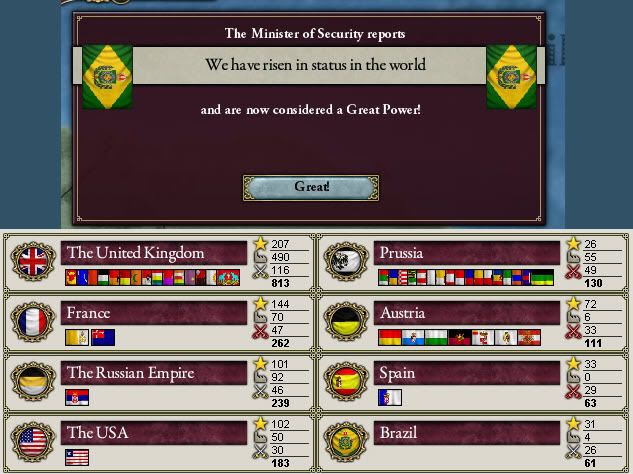
I knew we had it in us!
While not in the same level as other European Powers such as France and the UK, it could be said that Brazil was a young prospective Regional Power, and it was seen as such (at least temporarily) by other Powers in the world. The main factors mentioned in the report were the Brazilian upstart industrial sector and overall prestige and recognition, when compared to other lands.
The Iberian Front
Portugal sent most of its standing army to the frontier with France, to help the Spanish defend the land. And when these troops proved to be not enough, conscripted farmers and labourers were recruited all over the countryside and brought to the front.
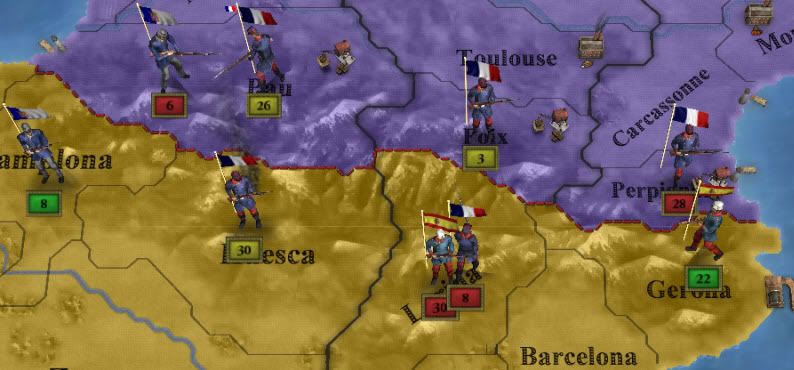
Despite the support Miguel received when he came back to the country, the substantial liberal population in Portugal saw this event as the worst thing that could happen to them. Miguel was a fierce absolutist and rumour was that he and his supporters would seek to progressively remove the established political rights and centralize the power on his person more and more. Before the war, there were already sentiments of revolt in many strata of the population.
In order to quell these complaints and secure his position as King, Dom Miguel saw Spain as Portugal’s most important ally – militarily and economically. And if the Iberians were saved from the aggressive French, the alliance would be long-lasting and the superior relations between the two countries would prevent any rebellion against Miguel, in the worst case even through military intervention by the Spanish. This would effectively put Portugal in the sphere of influence of Spain, in which one could argue it already was.
However, the war was still undecided.
The Bohemian Offensive
While the stalemate in the Pyrenees dragged itself for months, Prussia was progressing rather well in Bohemia. The Prussian strategy for the so-called ‘Bohemian Offensive’ was to concentrate as many troops as possible in the southern front with Austria and leave the Western border with France only slightly guarded, since it was expected France would focus on the Spanish front.
Due to superior tactics, training and leadership, the Prussians gained the upper hand and the Austrians were forced to hold defensive ground and assemble as many soldiers they could, even diverting troops from guard duty in their Italian territorial possessions.
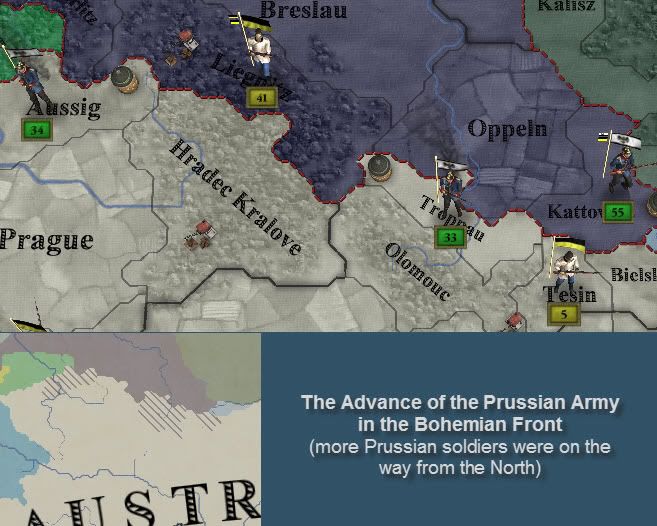
Little by little, Prussia advanced south.
The Portuguese Offer
On the 16th of October 1844, a small group of notable politicians arrived from Portugal in the Imperial Palace of São Cristóvão, located in the capital Rio de Janeiro. These were liberals led by a certain Diogo Oliveira and sought an emergency meeting with Dom Pedro II.
The situation in Portugal was at boiling point. Miguel remained on the throne, protected by loyal guards and by a great amount of bribe money. Meanwhile in the rest of the country, social conditions were dismal. Many families from the countryside were suffering from the effects of the war, as taxes were raised to the max in order to support the military. Furthermore the men, poorly trained common farmers and citizens, were being killed in the meat-grinder battles of the frontier. Poverty was spreading like wildfire and war exhaustion was increasing.
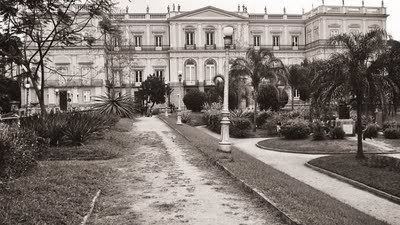
According to records of the time, Dom Pedro II was offered the loyalty of the Portuguese liberals and it was suggested that with Brazilian support, it was possible for a coup d’etat to succeed. For all that, there were conditions:
The reason for that was that while many Portuguese were unhappy with Dom Miguel, they would not accept a King who was to command the country from a former colony. In the words of the Portuguese liberal Diogo Oliveira:
“The Fatherland then becomes the Colony and the Colony the Fatherland”
Dom Pedro II, while Portuguese in blood, but also Brazilian of birth and Brazilian in the heart, declined the offer. Not because it was unattractive, on the contrary. But he felt he should not be like his father, who in a way abandoned the Brazilians and fled to Portugal. No, he would stay as Emperor of Brazil.
However, he extended his generosity to the Portuguese politicians and invited them to stay in Rio de Janeiro for the next few weeks. The liberal group was confused by the invite and agreed to stay, in hopes Dom Pedro II would change his mind.
The news from the Portuguese situation in Europe, brought by the Portuguese liberals, along with detailed accounts of the Portuguese fleet and army positions were of much help for Dom Pedro. And soon they understood why they were invited to stay in Brazil.
The Brazilian Intervention
The news came as a shock in Lisboa. The Ultimatum from Brazil was received and published in all main newspapers both in Brazil and Portugal. Dom Pedro II requests the end of the war and the signing of a white peace between Portugal and France/Austria in the next 3 days.
Knowing this would mean a betrayal towards his Spanish allies, Miguel did not comply and did not reply, expecting that Brazil would not follow the threats.
But followed they did:
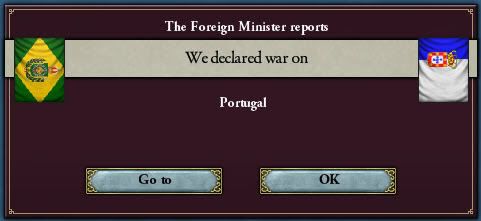
The War had the goal of Humiliating the Portuguese government in the beginning
“On this date, the 3rd of December 1844, the people and the Emperor Dom Pedro II of the Empire of Brazil declare the purpose and intention of restoring the order and maintaining the well-being of the Portuguese population. Through an unlawful declaration of war against France, the government of Portugal under Miguel I of the House of Bragança has brought much misfortune to the honest Portuguese people. It is the duty of the Brazilian Empire, as a brother nation who shares cultural and social ties to intervene in the affairs of the Portuguese government under Dom Miguel I in order to bring much needed relief and end the war. Let it be known that this will be complied. A peaceful occupation is desired and as far as possible intended. To the Portuguese population, we ask that all resistance against Brazilian troops be avoided, as it is for the own benefit of both.”
Interestingly enough, there was no mention of removing Dom Miguel from his position or any evidence that Brazil would somehow intervene in his government. This was deliberate, for Dom Pedro had a plan in mind.
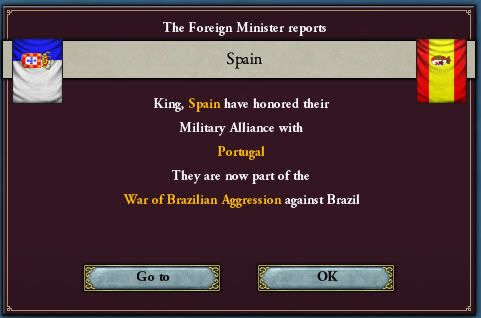
The Spanish, though being at war, honoured the defence of Portugal and declared war on Brazil. The Emperor knew he would not be able to take Spain alone, as they had a larger army. The Brazilian Army was still in a bad state.
But the war against France was much more important to the Spanish, as the future of their own homeland depended on that. While they remained fighting in the eastern Iberian Front, it would be safe for Brazil to restore the order in Portugal. It was a risky bet, but one which Dom Pedro was ready to take.
The First Brazilian Expedition
In order to scout the naval situation in Europe, two fleets were dispatched to patrol the north and South of the Atlantic coast of western Iberia.
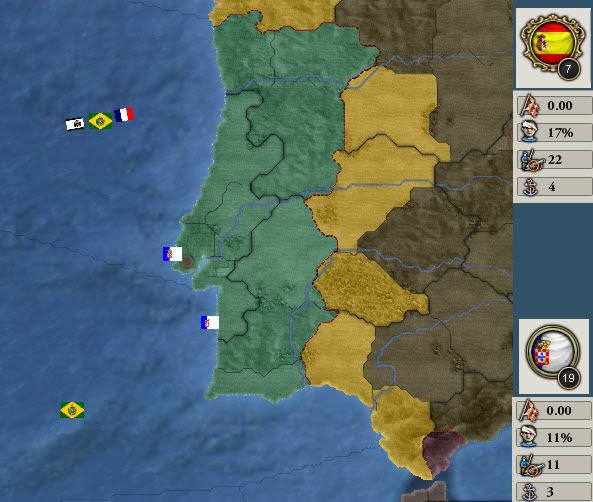
France was already blockading some of the Spanish and Portuguese ports, so all the Portuguese navy was docked. The Brazilian Navy was stronger than the remaining Portuguese and Spanish navies combined! With the “unofficial” French allies and their navy, Brazil did not have much to worry about.
And so the first Brazilian Expedition was dispatched. Due to his experience in the Cisplatinean war, the leader of the Offensive was named: Francisco Xavier Bras, our beloved perverse priest.
The first Brazilian Expeditionary Army [2 CAV, 2 INF] landed in Lisboa. Apart from the eventual loyalist resistance, the Portuguese Army was nowhere to be seen, as most of the standing army had already been destroyed by bloody battles against the French and attrition in the inhospitable heights of the Pyrenees. There, the situation was still undecided, as no stretches of land could be occupied. Day and night there were battles. What remained of the Portuguese military were the drafted regiments, but these too were involved in the fight against the French and practically under direct orders from the Spanish command, who could not spare any soldiers.
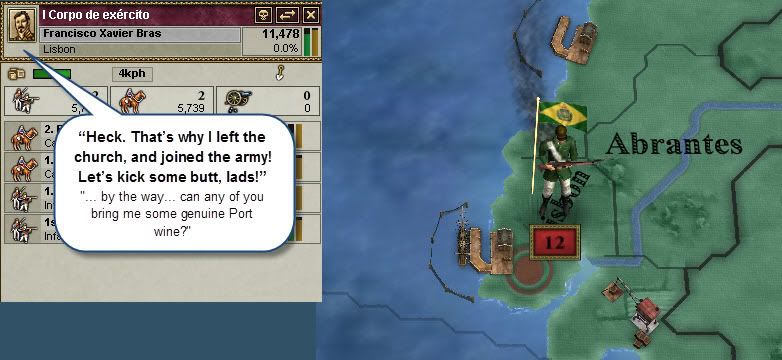
As soon as the Brazilian transport ships could be spotted on the horizon, Dom Miguel of Portugal, perceiving the danger, assembled his close officials and supporters and fled to Madrid in hopes to control the situation better from there. He hoped the war with the French would end soon, and then the Brazilians would not be able to stand the return of the Army of Spain.
But for now… the real Brazilian occupation of Portugal had begun… and not only that. A second expedition was sent to the southwestern African coast, namely Angola, to put pressure on the Portuguese overseas authorities.
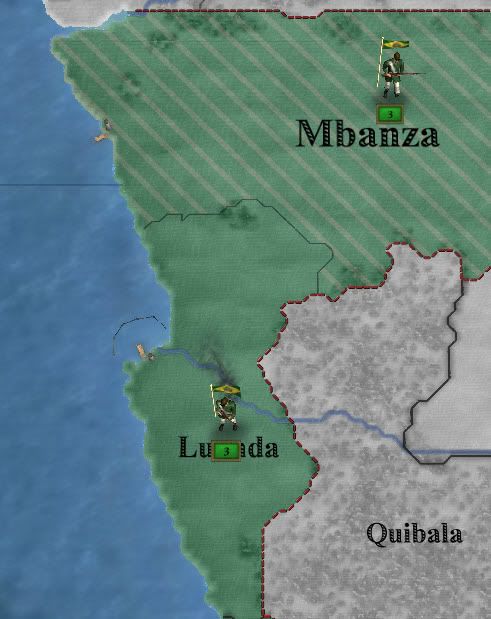
How will the war progress? What is the true intention with this war? Does the Empire have a chance or were the Emperor’s aspirations too grand for his own good?
To be continued...
Chapter 4: The Great War
“Dear brother, I hope this letter reaches you in good health and well across the Atlantic. This is my wish. I desire for you what I unfortunately do not have. This letter should have arrived in your hands carried by Mr. Xavier, who is my trusted aide for this task. Thanks to him and a few select of my inner circle, I can have peace of mind at least as far as the palace walls go. Lately I have not been feeling safe. I understand this might sound like a far-fetched theory or even delusions to you, but I do feel I am being observed at all times. I cannot eat well anymore, I spend my nights awake, and every strange movement seems to ignite a poisonous flame inside me. This has been happening since the death of Ferdinand, my husband. It seems the shadows observe every step I take, and every time I feel this way, I remember the troubled times caused by our uncle Miguel…”
The Brazilian supreme monarch Pedro II, to the people a sign of strength and hope for the future of Brazil, but at the same time a person with feelings and family like any other, read the letter from his sister Maria of Portugal again. The one letter which was stored in the drawers of his room for many months already and there he was too, alone. After finishing it he closed his eyes and sighed.
And so it was clear. The wretched scourge of the Brazilian people, the demagogue Teófilo dos Reis, the “hero of the Cisplatinean War”… he was involved, directly, in the death of Pedro’s sister – he and all the money he shameless stole from the land AND from the Emperor he was supposed to honour. And worst of all: he was at the service of Miguel, the usurper.
The Great European War of 1844
The war raged on Europe. For almost one whole year, it seemed the conflict would not end. On the heights of the Pyrenees many soldiers – Spanish, Portuguese and French - found their ultimate resting place. Endless battles were fought there. At the same time, Prussians and Austrians fought on Bohemia. And daily skirmishes, albeit less intense than the other battles elsewhere, happened in Alsace-Lorraine between Prussians and French. It was truly a Great War.
It was a long established policy of the Americans, especially South Americans, to leave the problems of Europe to the Europeans. There was nothing to gain by meddling. But this time, it was different. Brazil watched from afar, with the view set on one place in Europe, and one place only: Portugal.
Delayed reports of battles, which had to be transported by ship across the Ocean to reach Brazilian shores, were to be relayed almost immediately to the Emperor. He wanted to be up-to-date, and so it continued for almost a year. The Brazilian population would never expect that the Military would take any part on this war. The Brazilian industry continued to expand with regular investments by capitalists all over the country, everything seemed peaceful and normal.
The only thing that might have raised suspicion was the recall of troops from other regions of Brazil to the main port of Rio de Janeiro in the Southeast, where also 2 of the 3 Brazilian fleets were located.

But just like Dom Pedro II waited for years until it was the right moment for him to be crowned Emperor, he would also wait years to take action, if it was only deemed necessary.
Mid-1844, the government in Brazil received important news. According to a report to the American Senate by a politician and writer, James Hill, Brazil was mentioned as among the two possible future “Great Powers of the New World”, the USA being the other one.

I knew we had it in us!
While not in the same level as other European Powers such as France and the UK, it could be said that Brazil was a young prospective Regional Power, and it was seen as such (at least temporarily) by other Powers in the world. The main factors mentioned in the report were the Brazilian upstart industrial sector and overall prestige and recognition, when compared to other lands.
The Iberian Front
Portugal sent most of its standing army to the frontier with France, to help the Spanish defend the land. And when these troops proved to be not enough, conscripted farmers and labourers were recruited all over the countryside and brought to the front.

Despite the support Miguel received when he came back to the country, the substantial liberal population in Portugal saw this event as the worst thing that could happen to them. Miguel was a fierce absolutist and rumour was that he and his supporters would seek to progressively remove the established political rights and centralize the power on his person more and more. Before the war, there were already sentiments of revolt in many strata of the population.
In order to quell these complaints and secure his position as King, Dom Miguel saw Spain as Portugal’s most important ally – militarily and economically. And if the Iberians were saved from the aggressive French, the alliance would be long-lasting and the superior relations between the two countries would prevent any rebellion against Miguel, in the worst case even through military intervention by the Spanish. This would effectively put Portugal in the sphere of influence of Spain, in which one could argue it already was.
However, the war was still undecided.
The Bohemian Offensive
While the stalemate in the Pyrenees dragged itself for months, Prussia was progressing rather well in Bohemia. The Prussian strategy for the so-called ‘Bohemian Offensive’ was to concentrate as many troops as possible in the southern front with Austria and leave the Western border with France only slightly guarded, since it was expected France would focus on the Spanish front.
Due to superior tactics, training and leadership, the Prussians gained the upper hand and the Austrians were forced to hold defensive ground and assemble as many soldiers they could, even diverting troops from guard duty in their Italian territorial possessions.

Little by little, Prussia advanced south.
The Portuguese Offer
On the 16th of October 1844, a small group of notable politicians arrived from Portugal in the Imperial Palace of São Cristóvão, located in the capital Rio de Janeiro. These were liberals led by a certain Diogo Oliveira and sought an emergency meeting with Dom Pedro II.
The situation in Portugal was at boiling point. Miguel remained on the throne, protected by loyal guards and by a great amount of bribe money. Meanwhile in the rest of the country, social conditions were dismal. Many families from the countryside were suffering from the effects of the war, as taxes were raised to the max in order to support the military. Furthermore the men, poorly trained common farmers and citizens, were being killed in the meat-grinder battles of the frontier. Poverty was spreading like wildfire and war exhaustion was increasing.

The Imperial Palace of São Cristóvão
According to records of the time, Dom Pedro II was offered the loyalty of the Portuguese liberals and it was suggested that with Brazilian support, it was possible for a coup d’etat to succeed. For all that, there were conditions:
- Dom Pedro II would leave Brazil, return to Portugal and become King, reigning from Lisboa.
- Brazil would then be reinstated to a status a little higher than Colonial Territory, a sort of “Subject Kingdom”.
The reason for that was that while many Portuguese were unhappy with Dom Miguel, they would not accept a King who was to command the country from a former colony. In the words of the Portuguese liberal Diogo Oliveira:
“The Fatherland then becomes the Colony and the Colony the Fatherland”
Dom Pedro II, while Portuguese in blood, but also Brazilian of birth and Brazilian in the heart, declined the offer. Not because it was unattractive, on the contrary. But he felt he should not be like his father, who in a way abandoned the Brazilians and fled to Portugal. No, he would stay as Emperor of Brazil.
However, he extended his generosity to the Portuguese politicians and invited them to stay in Rio de Janeiro for the next few weeks. The liberal group was confused by the invite and agreed to stay, in hopes Dom Pedro II would change his mind.
The news from the Portuguese situation in Europe, brought by the Portuguese liberals, along with detailed accounts of the Portuguese fleet and army positions were of much help for Dom Pedro. And soon they understood why they were invited to stay in Brazil.
The Brazilian Intervention
The news came as a shock in Lisboa. The Ultimatum from Brazil was received and published in all main newspapers both in Brazil and Portugal. Dom Pedro II requests the end of the war and the signing of a white peace between Portugal and France/Austria in the next 3 days.
Knowing this would mean a betrayal towards his Spanish allies, Miguel did not comply and did not reply, expecting that Brazil would not follow the threats.
But followed they did:

The War had the goal of Humiliating the Portuguese government in the beginning
“On this date, the 3rd of December 1844, the people and the Emperor Dom Pedro II of the Empire of Brazil declare the purpose and intention of restoring the order and maintaining the well-being of the Portuguese population. Through an unlawful declaration of war against France, the government of Portugal under Miguel I of the House of Bragança has brought much misfortune to the honest Portuguese people. It is the duty of the Brazilian Empire, as a brother nation who shares cultural and social ties to intervene in the affairs of the Portuguese government under Dom Miguel I in order to bring much needed relief and end the war. Let it be known that this will be complied. A peaceful occupation is desired and as far as possible intended. To the Portuguese population, we ask that all resistance against Brazilian troops be avoided, as it is for the own benefit of both.”
Interestingly enough, there was no mention of removing Dom Miguel from his position or any evidence that Brazil would somehow intervene in his government. This was deliberate, for Dom Pedro had a plan in mind.

The Spanish, though being at war, honoured the defence of Portugal and declared war on Brazil. The Emperor knew he would not be able to take Spain alone, as they had a larger army. The Brazilian Army was still in a bad state.
But the war against France was much more important to the Spanish, as the future of their own homeland depended on that. While they remained fighting in the eastern Iberian Front, it would be safe for Brazil to restore the order in Portugal. It was a risky bet, but one which Dom Pedro was ready to take.
The First Brazilian Expedition
In order to scout the naval situation in Europe, two fleets were dispatched to patrol the north and South of the Atlantic coast of western Iberia.

France was already blockading some of the Spanish and Portuguese ports, so all the Portuguese navy was docked. The Brazilian Navy was stronger than the remaining Portuguese and Spanish navies combined! With the “unofficial” French allies and their navy, Brazil did not have much to worry about.
And so the first Brazilian Expedition was dispatched. Due to his experience in the Cisplatinean war, the leader of the Offensive was named: Francisco Xavier Bras, our beloved perverse priest.
The first Brazilian Expeditionary Army [2 CAV, 2 INF] landed in Lisboa. Apart from the eventual loyalist resistance, the Portuguese Army was nowhere to be seen, as most of the standing army had already been destroyed by bloody battles against the French and attrition in the inhospitable heights of the Pyrenees. There, the situation was still undecided, as no stretches of land could be occupied. Day and night there were battles. What remained of the Portuguese military were the drafted regiments, but these too were involved in the fight against the French and practically under direct orders from the Spanish command, who could not spare any soldiers.

As soon as the Brazilian transport ships could be spotted on the horizon, Dom Miguel of Portugal, perceiving the danger, assembled his close officials and supporters and fled to Madrid in hopes to control the situation better from there. He hoped the war with the French would end soon, and then the Brazilians would not be able to stand the return of the Army of Spain.
But for now… the real Brazilian occupation of Portugal had begun… and not only that. A second expedition was sent to the southwestern African coast, namely Angola, to put pressure on the Portuguese overseas authorities.

How will the war progress? What is the true intention with this war? Does the Empire have a chance or were the Emperor’s aspirations too grand for his own good?
To be continued...
Last edited:
Hi everyone, here's another update! I was expecting to cover the whole war in one chapter, but so many things happened that I had to split it in two parts/chapters. But no worries... It's not going to take me so long like before to post the following chapter and the end of the war. 
Great Update, great chapter, this was really exciting. Thank you for the Update! 
Just one more chapter and you are set for the contest, and i hope you update soon,
because i want to know how this war will go on with the portugese!
Just one more chapter and you are set for the contest, and i hope you update soon,
because i want to know how this war will go on with the portugese!
Good luck against those crafty Portuguese. Lovin' the aar so far. On a side note: Who else thinks that the AI's only real problem is that the balance of power never shifts unless you do it yourself? I love the fact that there are big European wars in 1.2.
Dom Pedro has some serious moxie. 
 I like the thought put into the update, the strategy, and Pedro's schemeing. Completely understanding the necessity of having multiple chapter updates, my only request is that you keep the excellent blend of dramedy you do so well. Nice pincer assault; here's to hoping Portuguese resistance will be minmal. If anyone could successfully unite Portugal under Brazillian rule - well, I'll wait and see.
I like the thought put into the update, the strategy, and Pedro's schemeing. Completely understanding the necessity of having multiple chapter updates, my only request is that you keep the excellent blend of dramedy you do so well. Nice pincer assault; here's to hoping Portuguese resistance will be minmal. If anyone could successfully unite Portugal under Brazillian rule - well, I'll wait and see. 
Thanks everyone for the comments.
@BigBadBob: Yeah, the power doesn't shift too much, but I guess that's the problem (or not, depending on the point of view) with the wargoal system. The infamy cost for a non-CB war is huge, and the AI takes care not to go over the infamy limit. At the same time, it doesn't seem like the AI is so determined like a human player, that keeps declaring war on a nation to decrease its power (wars are pretty random), so most GPs stay in their spots with or without wars.
@Communitarian!: Thanks for the reply. It takes a great while for me to write a chapter because there are so many details, and I usually read it again over and over a thousand times to get a feel of it before I post it. So the updates aren't very frequent, but I am glad people are interested!
I'll be posting a new chapter in a few minutes
@BigBadBob: Yeah, the power doesn't shift too much, but I guess that's the problem (or not, depending on the point of view) with the wargoal system. The infamy cost for a non-CB war is huge, and the AI takes care not to go over the infamy limit. At the same time, it doesn't seem like the AI is so determined like a human player, that keeps declaring war on a nation to decrease its power (wars are pretty random), so most GPs stay in their spots with or without wars.
@Communitarian!: Thanks for the reply. It takes a great while for me to write a chapter because there are so many details, and I usually read it again over and over a thousand times to get a feel of it before I post it. So the updates aren't very frequent, but I am glad people are interested!
I'll be posting a new chapter in a few minutes
Thanks everyone for the comments.
@BigBadBob: Yeah, the power doesn't shift too much, but I guess that's the problem (or not, depending on the point of view) with the wargoal system. The infamy cost for a non-CB war is huge, and the AI takes care not to go over the infamy limit. At the same time, it doesn't seem like the AI is so determined like a human player, that keeps declaring war on a nation to decrease its power (wars are pretty random), so most GPs stay in their spots with or without wars.
@Communitarian!: Thanks for the reply. It takes a great while for me to write a chapter because there are so many details, and I usually read it again over and over a thousand times to get a feel of it before I post it. So the updates aren't very frequent, but I am glad people are interested!
I'll be posting a new chapter in a few minutes
yeah!
Chapter V
“Is the cargo secure?” – said the Captain of the Guanabara, Afonso Bittencourt.
“Yes sir, everything is in order. The supplies for the 1st Army Corps in Évora have just been loaded and the supp..” – the naval officer in the port of Rio de Janeiro was interrupted by the old bearded Captain, who seemed rather nervous.
“Is the French cargo in order?” – he spoke slowly, the words ‘French cargo’ were stressed.
“Yes…” the official hesitated “Certainly… sir, here’s the inventory.”
“You know, Mr. Ferreira, that is very important. Priority orders from the Emperor himself.”
The newly built Guanabara, a Man’o’war, was en route to supply the Brazilian expeditionary force in Portugal and make then a second stop in the western French port of La Rochelle. Among various supplies, there was the special French cargo – a sizeable amount of Gold from the mines in the Brazilian region of Minas Gerais, which was intended as a payment of ammunition and military wares that Brazil could not produce and had to import on debt. The French were supplying these directly to the captured Brazilian port of Lisboa and it was already time Brazil paid part of the debt back.
The Brazilian Navy was confident. It had won many battles against the Spanish and Portuguese navy and the might of its ships seemed to be unstoppable.
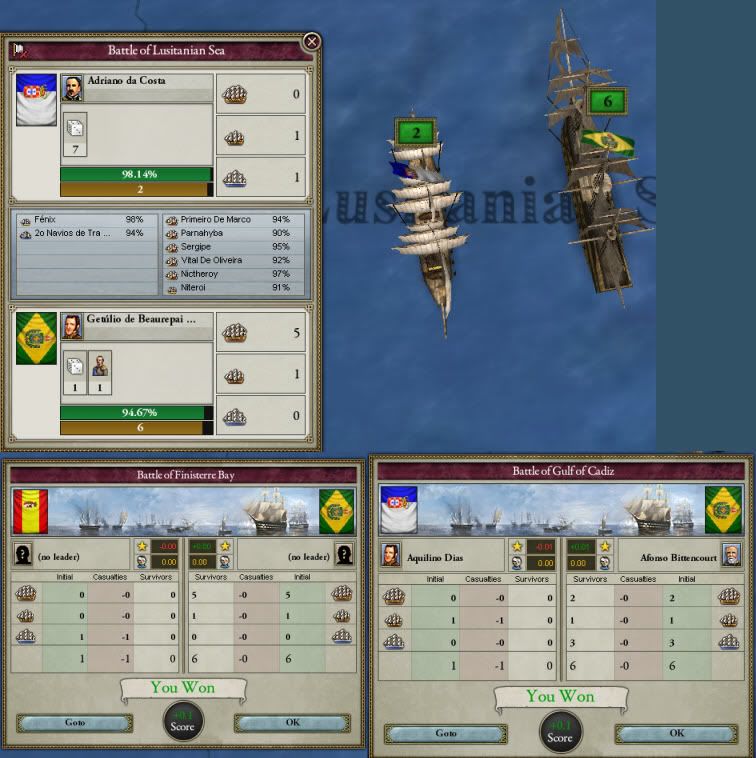
Both the coast of Africa and the Iberian sea were being constantly patrolled, so it was deemed safe for the Guanabara to be sent alone with an able crew. However, the ship faced storms in the Atlantic and was heavily battered. And worse: near the Canary Islands it was suddenly intercepted by a small Spanish fleet coming from the Caribbean, unaware of the valuable cargo being carried aboard.
Despite a valiant and fierce battle, the Brazilians could not receive reinforcements on time, and the fate of the Guanabara and its cargo was sealed: to rest on the ocean floor. Even in our present time, it has not yet been found.
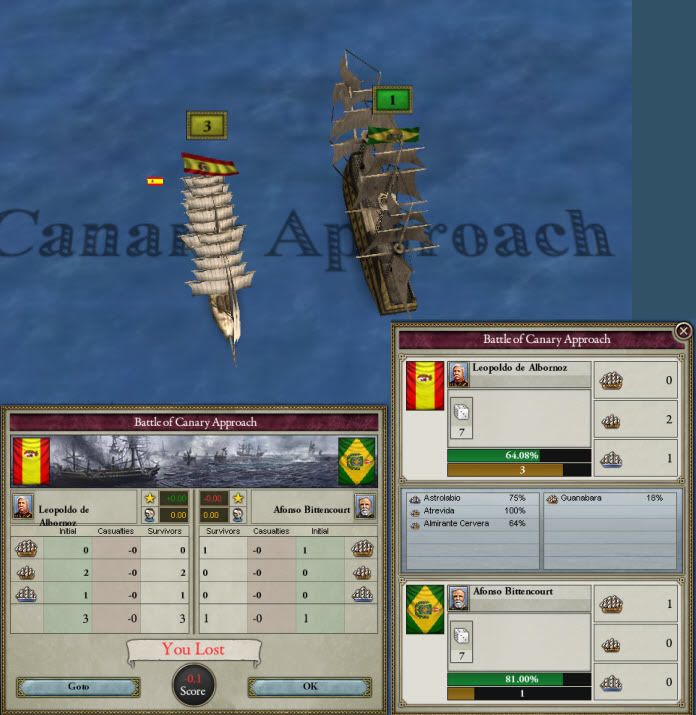
When Emperor Dom Pedro II received the bitter news, it is described that in his rage – unusual for his personality - he broke many windows of the palace of São Cristóvão and rushed to his private study. He demanded a meeting with the army and navy commanders, his trusted old friend and former tutor José Bonifácio, and curiously enough… specialists of royal genealogy and history, both Portuguese and Brazilian.
There they held continuous meetings for 3 whole days.
The Dynastic Demand
At this time, most of Portugal had been already occupied by the Brazilian Empire, which managed to transport its ‘Second Army Corps’ to Europe. A total of 9 divisions were spread over Lusitanian lands.
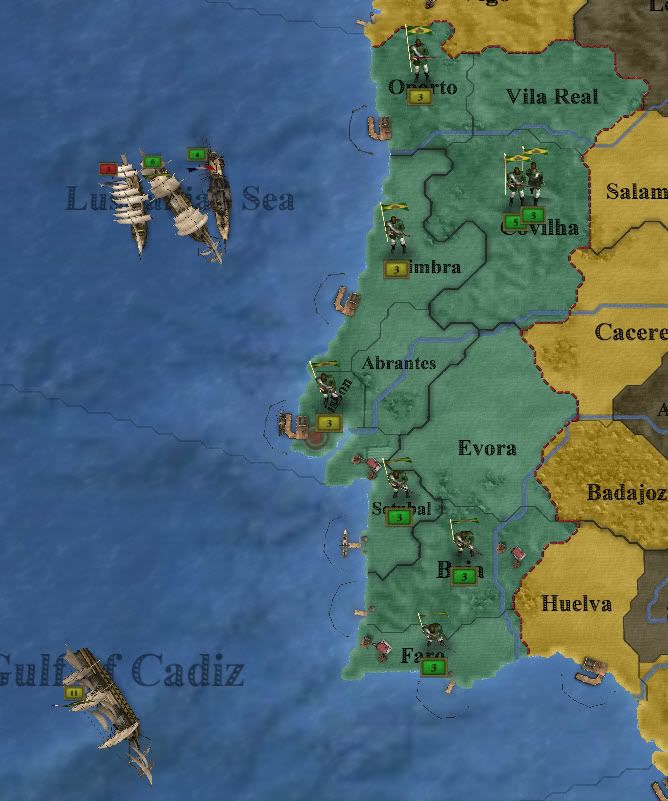
However, realistically speaking, it was clear that Brazil would not have anything to gain just by intervening in a war initially declared with the objective of protecting the poor Portuguese people from their own government. The Brazilian treasury was rapidly depleting, as the war turned to be costly and most supplies had to be imported. The sinking of the Guanabara was just another nail in the coffin of a positive Brazilian budget.
Dom Pedro II and his advisors were aware of that. But they were also aware of the risks of the war and the scope of the Brazilian capabilities when facing a foe with superiority in the number of soldiers.
Dom Pedro’s plan, clearly thought out before the declaration of war, now had to be slightly changed to accommodate recent developments. But this was for the better.
For now, the Empire of Brazil had the advantage, but it would not last forever. The time was appropriate, and after several meetings, the Emperor decided to take action. The people of Rio de Janeiro were assembled in the downtown district. The Emperor appeared to them in person on the balcony of the building occupied by Ministry of War, and made a stunning public announcement to the masses, one which would not be easily forgotten:
As he finished these words, the crowds on the streets cheered, and acclaimed with one united voice: “HAIL THE EMPIRE! HAIL THE EMPEROR!”
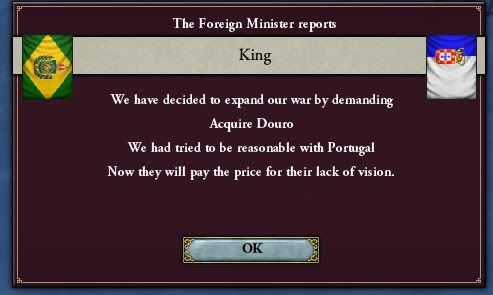
The charisma of the young Emperor was striking, and he had an immense popular support. Some Reactionary and Conservative members of the society were against this move, but they would not dare to say anything against the Emperor, since that would mean a great risk for their political career.
The move was clear: through obscure genealogical documents and laws, Brazil generated evidence that many scattered stretches of land in northern Portugal indeed belonged in part to Dom Pedro after the death of his sister Maria. Additionally, the sinking of the Guanabara proved to be an additional reason to claim these lands as reparations for the loss of an exaggerated amount of gold (numbers which were partly inflated).
Using diplomatic means, the effective control of northern Portugal was intended to be passed to the Brazilian crown for an undefined amount of time, loosely described as a “Protectorate” or “Zone of Occupation”.
The international community was divided. Some countries saw this move by Dom Pedro as a rightful one, some considered it unwarranted aggression. But the great majority was more concerned with the Greater War raging on Europe between 4 Great Powers, and the Brazilian demand was largely ignored by the other Great Powers.
Tilting the Scales
The occupation of Portugal continued. There was a point of concern, though, as the Prussian advance in Austria made it likely that the Franco-Austrian Alliance in the war would not hold for much longer. On April 1845, 5 months after the Brazilian declaration of war, the Austrians signed a white peace with Prussia.
Why a white peace? King Friedrich Wilhelm IV had another strategy in mind, namely the annexation of Alsace-Lorraine which contained a great amount of German population, and Languedoc, a side war goal… which he ostensibly declared as Prussia’s ultimate demand from France. These new war goals were cleverly announced before the capitulation of Austria.
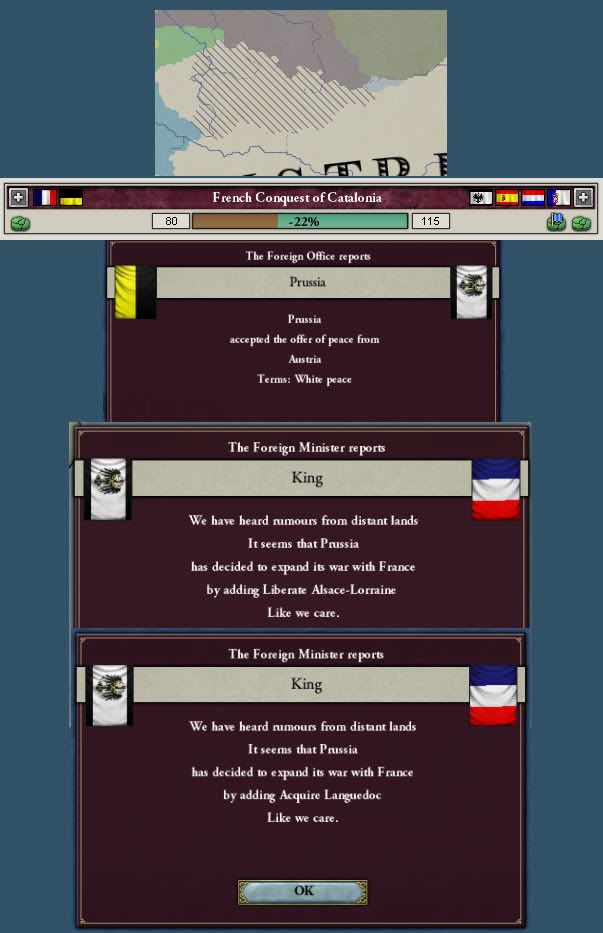
France did have a problem in its hands. And if France had a problem, Brazil definitely had one too.
The battles still raged east on the Pyrenees. The French managed to make an advance by mid-1845, by diverting some divisions to the Spanish colonial possessions in North Africa. The frontlines on the Pyrenees slowly started to flow westwards, as French pushed the Iberian troops back and occupied most of the towns and cities of Catalonia, which were by then practically a pile of rubble.
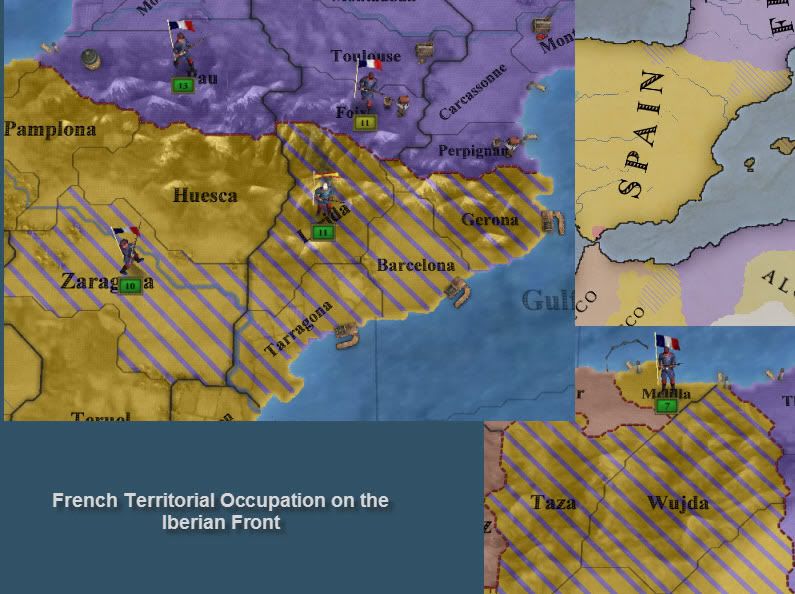
Opening of a Front
The last Prussian troops retreating from Bohemia did not have time to rest, as they were immediately diverted to the west, to fight in Alsace-Lorraine. The true objectives of the Prussians all along in the war were to acquire land from the French.
The French were in a bad position. Fighting a two front war would be increasingly difficult. With a nominal army in the northeast, the French were finding it hard to defend themselves from constant Prussian attacks and their experienced troops fresh from the Bohemian Front.
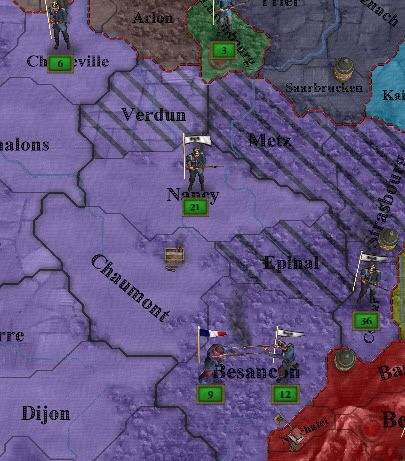
Strasbourg took long to fall. The French garrison did their best to defend the province, but were forced back as more and more reinforcements arrived to the enemy side.
Dom Pedro was well aware of these developments. If France was completely defeated, the war would be lost. Facing this difficult situation, José Bonifácio advised the young Emperor to attack Spain preemptively. Once the greater part of Portugal was directly under Brazilian control, some troops would be diverted to the east towards Madrid.
This was a risky move, as the Spanish could only then realize the risk they were running and divert some of their few remaining troops to fight the Brazilian invaders. But once more, Dom Pedro took the risk and gave orders for his generals to advance over the Spanish Frontier.
The Brazilian Invasion of Spain
While the French were winning on the Iberian Front, the situation was dismal on the Eastern Front. However, the Spanish army was practically destroyed and could not return to defend their lands from the Brazilians, as they were bogged down and pursued by the French. And so it happened: as soon as the Brazilian 1st Army reached Madrid, the Spanish gave up and signed peace with France.
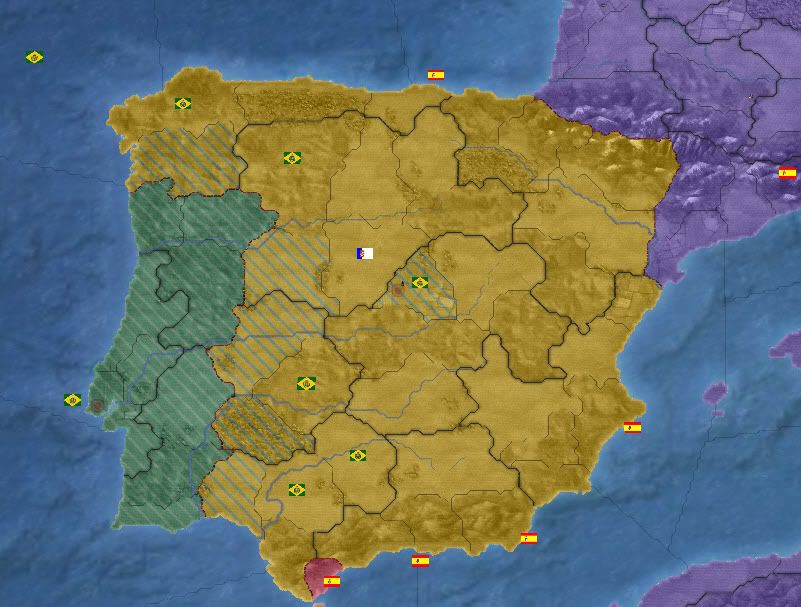
A quick succession of events followed. France acquires their desired territory of Catalonia, but remains at war with Prussia.
Once again the Iberian Royal Families had fled to the east, but now the situation was different. With no French threat, the remaining Spanish and Portuguese army turned westwards and marched to meet the Brazilian soldiers scattered over western Spain.
The whole Portuguese Army, mostly conscripts, was the first to arrive and engaged a moving detachment of the 2nd Brazilian Army in Avila.
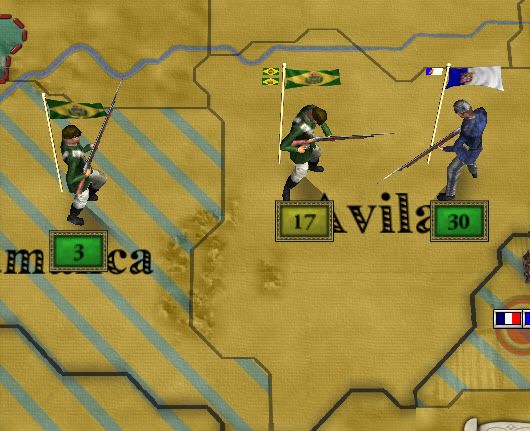
While most Spanish regiments were leaving the newly established French State of Catalonia, the Brazilian troops under general Urbano Constant stormed the Royal Palace of Madrid. That was a clear blow to the Spanish government, which now for almost 2 years was suffering the effects of the war.
Having lost the region of Catalonia and facing a possible attrition war against the Brazilian as well as the port blockades by the Brazilian navy, the Spanish decided the defense of Portugal was not worth the trouble and the possible consequences of popular revolt.
Dom Pedro II also wished to avoid a continuation of the war. The Brazilian debt was increasing and the treasury of Brazil was empty. Further war would mean the demise of the Brazilian economy.
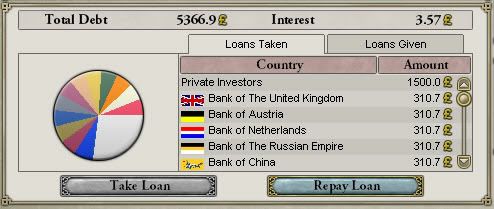
In face of these problems, Dom Pedro II agreed to negotiate with Spain. On the 13th of October 1845, the Spanish signed a separate peace with Brazil, not consulting the Portuguese Royal Family. As peace terms, all demands of Dom Pedro were granted!
The downside of the peace was that as part of the terms, Miguel I was allowed to continue ruling as King of Portugal, under protection of Spain and close watch of Brazilian peacekeeping forces. The vile Miguel could not be removed this time, but Dom Pedro was sure his uncle would not remain on the throne forever. At least not if it depended on him.
However, the Region of Douro was transferred to Brazil as a Brazilian Protectorate / Occupation Zone and Portugal was deeply humiliated.
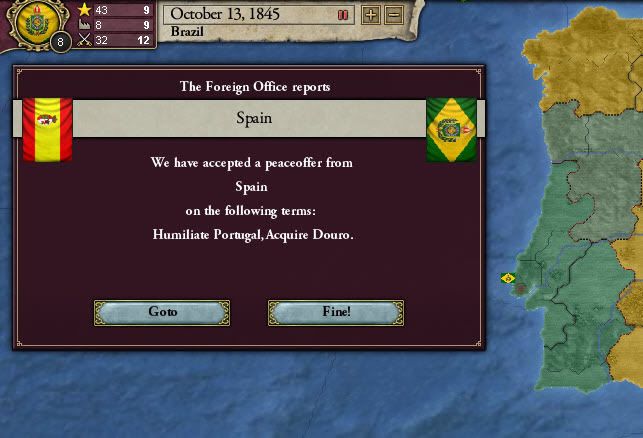
The Empire of Brazil is victorious!
Military parades and festivals, which lasted for days, were held in the main cities of Brazil. The 13th of October was declared a National Holiday and many Brazilian veterans, especially in the navy, were awarded medals for their bravery.
Brazil now could clearly claim to be a Great Power, with possessions in Europe no less!
HAIL THE BRAZILIAN EMPIRE!
Chapter 5: Brazilian Imperial Ambitions
“Is the cargo secure?” – said the Captain of the Guanabara, Afonso Bittencourt.
“Yes sir, everything is in order. The supplies for the 1st Army Corps in Évora have just been loaded and the supp..” – the naval officer in the port of Rio de Janeiro was interrupted by the old bearded Captain, who seemed rather nervous.
“Is the French cargo in order?” – he spoke slowly, the words ‘French cargo’ were stressed.
“Yes…” the official hesitated “Certainly… sir, here’s the inventory.”
“You know, Mr. Ferreira, that is very important. Priority orders from the Emperor himself.”
The newly built Guanabara, a Man’o’war, was en route to supply the Brazilian expeditionary force in Portugal and make then a second stop in the western French port of La Rochelle. Among various supplies, there was the special French cargo – a sizeable amount of Gold from the mines in the Brazilian region of Minas Gerais, which was intended as a payment of ammunition and military wares that Brazil could not produce and had to import on debt. The French were supplying these directly to the captured Brazilian port of Lisboa and it was already time Brazil paid part of the debt back.
The Brazilian Navy was confident. It had won many battles against the Spanish and Portuguese navy and the might of its ships seemed to be unstoppable.

Both the coast of Africa and the Iberian sea were being constantly patrolled, so it was deemed safe for the Guanabara to be sent alone with an able crew. However, the ship faced storms in the Atlantic and was heavily battered. And worse: near the Canary Islands it was suddenly intercepted by a small Spanish fleet coming from the Caribbean, unaware of the valuable cargo being carried aboard.
Despite a valiant and fierce battle, the Brazilians could not receive reinforcements on time, and the fate of the Guanabara and its cargo was sealed: to rest on the ocean floor. Even in our present time, it has not yet been found.

When Emperor Dom Pedro II received the bitter news, it is described that in his rage – unusual for his personality - he broke many windows of the palace of São Cristóvão and rushed to his private study. He demanded a meeting with the army and navy commanders, his trusted old friend and former tutor José Bonifácio, and curiously enough… specialists of royal genealogy and history, both Portuguese and Brazilian.
There they held continuous meetings for 3 whole days.
The Dynastic Demand
At this time, most of Portugal had been already occupied by the Brazilian Empire, which managed to transport its ‘Second Army Corps’ to Europe. A total of 9 divisions were spread over Lusitanian lands.

However, realistically speaking, it was clear that Brazil would not have anything to gain just by intervening in a war initially declared with the objective of protecting the poor Portuguese people from their own government. The Brazilian treasury was rapidly depleting, as the war turned to be costly and most supplies had to be imported. The sinking of the Guanabara was just another nail in the coffin of a positive Brazilian budget.
Dom Pedro II and his advisors were aware of that. But they were also aware of the risks of the war and the scope of the Brazilian capabilities when facing a foe with superiority in the number of soldiers.
Dom Pedro’s plan, clearly thought out before the declaration of war, now had to be slightly changed to accommodate recent developments. But this was for the better.
For now, the Empire of Brazil had the advantage, but it would not last forever. The time was appropriate, and after several meetings, the Emperor decided to take action. The people of Rio de Janeiro were assembled in the downtown district. The Emperor appeared to them in person on the balcony of the building occupied by Ministry of War, and made a stunning public announcement to the masses, one which would not be easily forgotten:
“My beloved Brazilian people, brave and hardworking citizens of the Empire. I come to you today with serious news. As it is widely known, we have intervened in the affairs of Europe and have sent an expeditionary force to maintain peace in the Iberian Peninsula. Many are doubtful of heart, and question why that is so necessary. Such arguments are sensible, and would be entirely justified had it been purely a Brazilian aggression. But that was it not!
It is our duty as a brother nation to defend the Portuguese people, unwillingly dragged to war by the vile Spanish. It is as though they had no other choice, being led by an incompetent and weak-willed government. We have so far avoided confrontation as much as possible with both the loyalist Portuguese and the Spanish soldiers especially. Our pure and sincere objectives were only to preserve the well-being of our Portuguese brothers.
But heed my words! Not respecting our noble objective, the Spanish – incited by the greedy government of Dom Miguel of Portugal and their wretchedness - decided to cowardly attack and sink a peaceful Brazilian transport ship, conveying food and clothes to be delivered to our troops! Dozens of our fellow citizens died in this unprovoked attack, and additionally, a cargo of Gold destined to support the economy, to help the ailing citizens of Europe, and our own soldiers engaged in peacemaking activities… was lost in the battle. This was gold, our gold, our valuables which we Brazilians toiled so hard to acquire….
It is clear the administration of Portugal does not have the ability nor the rights necessary to govern their own lands. For that reason I feel, being the Caretaker of our Nation, obliged to take further action. I am the Emperor of Brazil, but also a member of the House of Bragança. Therefore, the Empire has claims to the lands of Douro and around the city of Bragança in northern Portugal.
Additionally, in light of all recent events, I declare today… that for the might of the Brazilian people and for the reassurance of the Brazilian Empire, let it be known today that the Empire of Brazil intends to further its influence in Portugal, as a blessing and duty bestowed upon us by the almighty God above to protect the innocent and save the afflicted. We will retaliate to defend our rights! We will make the Spanish, and any other nation who doubts of our capabilities as a strong and united people, know that Brazil has its rightful place in the world, now… and forever! Hail the EMPIRE of Brazil!”
It is our duty as a brother nation to defend the Portuguese people, unwillingly dragged to war by the vile Spanish. It is as though they had no other choice, being led by an incompetent and weak-willed government. We have so far avoided confrontation as much as possible with both the loyalist Portuguese and the Spanish soldiers especially. Our pure and sincere objectives were only to preserve the well-being of our Portuguese brothers.
But heed my words! Not respecting our noble objective, the Spanish – incited by the greedy government of Dom Miguel of Portugal and their wretchedness - decided to cowardly attack and sink a peaceful Brazilian transport ship, conveying food and clothes to be delivered to our troops! Dozens of our fellow citizens died in this unprovoked attack, and additionally, a cargo of Gold destined to support the economy, to help the ailing citizens of Europe, and our own soldiers engaged in peacemaking activities… was lost in the battle. This was gold, our gold, our valuables which we Brazilians toiled so hard to acquire….
It is clear the administration of Portugal does not have the ability nor the rights necessary to govern their own lands. For that reason I feel, being the Caretaker of our Nation, obliged to take further action. I am the Emperor of Brazil, but also a member of the House of Bragança. Therefore, the Empire has claims to the lands of Douro and around the city of Bragança in northern Portugal.
Additionally, in light of all recent events, I declare today… that for the might of the Brazilian people and for the reassurance of the Brazilian Empire, let it be known today that the Empire of Brazil intends to further its influence in Portugal, as a blessing and duty bestowed upon us by the almighty God above to protect the innocent and save the afflicted. We will retaliate to defend our rights! We will make the Spanish, and any other nation who doubts of our capabilities as a strong and united people, know that Brazil has its rightful place in the world, now… and forever! Hail the EMPIRE of Brazil!”
As he finished these words, the crowds on the streets cheered, and acclaimed with one united voice: “HAIL THE EMPIRE! HAIL THE EMPEROR!”

The charisma of the young Emperor was striking, and he had an immense popular support. Some Reactionary and Conservative members of the society were against this move, but they would not dare to say anything against the Emperor, since that would mean a great risk for their political career.
The move was clear: through obscure genealogical documents and laws, Brazil generated evidence that many scattered stretches of land in northern Portugal indeed belonged in part to Dom Pedro after the death of his sister Maria. Additionally, the sinking of the Guanabara proved to be an additional reason to claim these lands as reparations for the loss of an exaggerated amount of gold (numbers which were partly inflated).
Using diplomatic means, the effective control of northern Portugal was intended to be passed to the Brazilian crown for an undefined amount of time, loosely described as a “Protectorate” or “Zone of Occupation”.
The international community was divided. Some countries saw this move by Dom Pedro as a rightful one, some considered it unwarranted aggression. But the great majority was more concerned with the Greater War raging on Europe between 4 Great Powers, and the Brazilian demand was largely ignored by the other Great Powers.
Tilting the Scales
The occupation of Portugal continued. There was a point of concern, though, as the Prussian advance in Austria made it likely that the Franco-Austrian Alliance in the war would not hold for much longer. On April 1845, 5 months after the Brazilian declaration of war, the Austrians signed a white peace with Prussia.
Why a white peace? King Friedrich Wilhelm IV had another strategy in mind, namely the annexation of Alsace-Lorraine which contained a great amount of German population, and Languedoc, a side war goal… which he ostensibly declared as Prussia’s ultimate demand from France. These new war goals were cleverly announced before the capitulation of Austria.

What? Heck… we really DO care…!
France did have a problem in its hands. And if France had a problem, Brazil definitely had one too.
The battles still raged east on the Pyrenees. The French managed to make an advance by mid-1845, by diverting some divisions to the Spanish colonial possessions in North Africa. The frontlines on the Pyrenees slowly started to flow westwards, as French pushed the Iberian troops back and occupied most of the towns and cities of Catalonia, which were by then practically a pile of rubble.

Opening of a Front
The last Prussian troops retreating from Bohemia did not have time to rest, as they were immediately diverted to the west, to fight in Alsace-Lorraine. The true objectives of the Prussians all along in the war were to acquire land from the French.
The French were in a bad position. Fighting a two front war would be increasingly difficult. With a nominal army in the northeast, the French were finding it hard to defend themselves from constant Prussian attacks and their experienced troops fresh from the Bohemian Front.

Strasbourg took long to fall. The French garrison did their best to defend the province, but were forced back as more and more reinforcements arrived to the enemy side.
Dom Pedro was well aware of these developments. If France was completely defeated, the war would be lost. Facing this difficult situation, José Bonifácio advised the young Emperor to attack Spain preemptively. Once the greater part of Portugal was directly under Brazilian control, some troops would be diverted to the east towards Madrid.
This was a risky move, as the Spanish could only then realize the risk they were running and divert some of their few remaining troops to fight the Brazilian invaders. But once more, Dom Pedro took the risk and gave orders for his generals to advance over the Spanish Frontier.
The Brazilian Invasion of Spain
While the French were winning on the Iberian Front, the situation was dismal on the Eastern Front. However, the Spanish army was practically destroyed and could not return to defend their lands from the Brazilians, as they were bogged down and pursued by the French. And so it happened: as soon as the Brazilian 1st Army reached Madrid, the Spanish gave up and signed peace with France.

A quick succession of events followed. France acquires their desired territory of Catalonia, but remains at war with Prussia.
Once again the Iberian Royal Families had fled to the east, but now the situation was different. With no French threat, the remaining Spanish and Portuguese army turned westwards and marched to meet the Brazilian soldiers scattered over western Spain.
The whole Portuguese Army, mostly conscripts, was the first to arrive and engaged a moving detachment of the 2nd Brazilian Army in Avila.

While most Spanish regiments were leaving the newly established French State of Catalonia, the Brazilian troops under general Urbano Constant stormed the Royal Palace of Madrid. That was a clear blow to the Spanish government, which now for almost 2 years was suffering the effects of the war.
Having lost the region of Catalonia and facing a possible attrition war against the Brazilian as well as the port blockades by the Brazilian navy, the Spanish decided the defense of Portugal was not worth the trouble and the possible consequences of popular revolt.
Dom Pedro II also wished to avoid a continuation of the war. The Brazilian debt was increasing and the treasury of Brazil was empty. Further war would mean the demise of the Brazilian economy.

In face of these problems, Dom Pedro II agreed to negotiate with Spain. On the 13th of October 1845, the Spanish signed a separate peace with Brazil, not consulting the Portuguese Royal Family. As peace terms, all demands of Dom Pedro were granted!
The downside of the peace was that as part of the terms, Miguel I was allowed to continue ruling as King of Portugal, under protection of Spain and close watch of Brazilian peacekeeping forces. The vile Miguel could not be removed this time, but Dom Pedro was sure his uncle would not remain on the throne forever. At least not if it depended on him.
However, the Region of Douro was transferred to Brazil as a Brazilian Protectorate / Occupation Zone and Portugal was deeply humiliated.

The Empire of Brazil is victorious!
Military parades and festivals, which lasted for days, were held in the main cities of Brazil. The 13th of October was declared a National Holiday and many Brazilian veterans, especially in the navy, were awarded medals for their bravery.
Brazil now could clearly claim to be a Great Power, with possessions in Europe no less!
HAIL THE BRAZILIAN EMPIRE!
Last edited:

